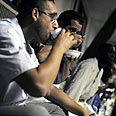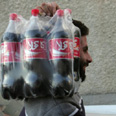

Coca-Cola is a Ramadan favorite in Gaza, but is banned by Israel's blockade on the Hamas-ruled territory, which only allows in humanitarian aid and basic foods.
That helps make the holy month peak season for the territory's smugglers, who throughout the year haul everything from motorcycles to detergent through tunnels under the border with Egypt.
During Ramadan, demand is particularly high for soft drinks and chocolates – sweet treats consumed after the fast-breaking evening meal, which Israel also bans. Smugglers also beef up imports of shoes, clothes and toys, bought in larger quantities for Eid al-Fitr, the three-day holiday capping Ramadan when families traditionally buy new clothes and other gifts.
Tunnel boss Jihad says he imports more than 100,000 cans of soda a day during the fasting month, particularly Coca-Cola – double the amount he normally hauls in. Jihad, who asked that his family name not be used because he works in an illicit activity, has 32 laborers working from 6 am to 11 pm, six days a week, using an electric pulley to move the goods.
Most of the smugglers observe the fast, adding to the hardship of working in the unstable underground passages. More than 100 men have died in tunnel collapses since Israel and Egypt imposed a border blockade on Gaza in June 2007 after Hamas seized power of the coastal territory.
On a recent morning, a smuggler, 25-year-old Atta, rested between hauls on an iron-frame bed in the sandy, rubble-strewn area near a tunnel exit. "It's always the thirst and tiredness. But I won't break my fast," he said, shrugging his shoulders in a smeared white undershirt.
With the Islamic militant Hamas increasingly cementing control and silencing opponents, some Gazans resort to subtle acts of defiance.
Yellow lantern a best-seller
Choosing a Ramadan lantern is one. The brightly painted, battery-powered lanterns are hung in homes as a symbol of the season and come in different colors.
This year's best-seller is yellow, the color of Hamas' political rival, Fatah, said Taha, a Gaza City toy vendor. Green, the color of Hamas, isn't in much demand.
"Customers tell me: `I want yellow, I don't want any other color!" Taha, 21, said.
"Now I've got a whole bunch of green lamps I can't sell," said the merchant, who asked not use his family name because he didn't want to get in trouble with Hamas.
Gaza residents once proudly waved their factional flags from their rooftops. But under Hamas' tough rule, Fatah loyalists are often hounded, and few people dare to hoist flags of other factions, making lanterns a subversive sign of loyalty.
The lack of demand for green isn't necessarily a sign of dwindling support for Hamas, lantern sellers said. Hamas loyalists are free to wave their own green flags, so they don't need green lanterns to make a statement.
Gaza's few leftists are snapping up Taha's pink lamps – the closest to their signature color red.
"But nobody wants the blue lanterns. They aren't factional," Taha said.
Gaza's artisans are making a comeback as residents resort to their traditional ways to survive the blockade.
Sabri Atallah's pottery workshop is thriving. Using local clay, he makes building bricks and roof tiles. And in a month when Gazans obsess over Iftar, the meal that breaks the 13-hour fast, there's a surge in demand for clay pots, which are used to bake Gaza's signature dish of shrimp, tomatoes, nuts and chili peppers.
Attallah's workshop buzzes with barefoot young men in rolled up pants hauling clay, tending his kiln and working on pottery wheels. The bustle is in stark contrast to the deserted factories across Gaza. Virtually all have been forced to close because of the blockade, which prevents the import of raw materials and the export of manufactured goods.
"We only turn to Gaza products when we can't buy things from abroad," said Attallah, 56. "But we should be proud of what we have."
A challenging time
Gaza's largest and chronically overburdened hospital, Shifa, is normally a hive of haggard doctors, bearded male nurses in flip-flops and noisy families crowing around patients.
But during the daylight hours of Ramadan, Shifa's hallways are eerily quiet. Patients and visitors are fewer, and the fasting staff is too tired to make much noise.
Dr. Ahmad Fayoumi, head of admissions in the internal medicine department, says he sees around an average of 150 patients during the day in Ramadan – half the usual number.
"Because people aren't eating, their bodies are resting," says Fayoumi. "Diabetics don't have insulin problems, blood pressure goes down and the heart rests."
But the evenings make up for the daytime calm.
For many hungry Muslims, breaking the day's fast is a time to gorge on fatty meats, spicy rice and syrup-drenched fried pancakes stuffed with cheese, a Ramadan favorite.
Fayoumi says the sugar-and-fat laden meals bring mostly middle-aged patients back to the hospital with high blood sugar or heartburn.
"I'd call it a poor use of food," Fayoumi said. "The body should be slowly prepared for food. Start with a date. Drink some milk. Pray. Then eat."
The women in Gaza City's shrinking middle class jostle to have their hair done by Ramzi, a coiffeur so famous here he's reverently referred to by only his first name.
But Ramadan is a challenging time, both for the hairdresser and his customers.
Devout Muslim women believe it is forbidden for any man, apart from their husband, father and brothers, to see their hair. It's a ruling that most wealthy Gazan women ignore – except in Ramadan, when even the most casual Muslims become a little more devout.
At the moment, Ramzi's shop is empty. "It's expected," he said, rolling his eyes as he folded tin foil pieces he uses to color hair. "For the first 20 days of Ramadan, everybody becomes religious."
He says his customers will troop back soon to prepare for the Eid al-Fitr holiday. "In the last 10 days (of Ramadan), they beg Ramzi to fix them up," he said.















